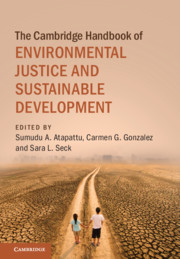Book contents
- The Cambridge Handbook of Environmental Justice and Sustainable Development
- The Cambridge Handbook of Environmental Justice and Sustainable Development
- Copyright page
- Contents
- Contributors
- Acknowledgments
- Foreword (on Living in an Interregnum)
- 1 Intersections of Environmental Justice and Sustainable Development
- Part I Frameworks
- 2 The Indivisibility of Human Dignity and Sustainability
- 3 Environmental Justice in the Global South
- 4 Indigenous Environmental Justice and Sustainability
- 5 Racial Capitalism and the Anthropocene
- 6 Human Rights and Socioecological Justice through a Vulnerability Lens
- 7 Social–Ecological Resilience and Its Relation to the Social Pillar of Sustainable Development
- 8 Environmental Justice and Sustainability
- Part II Case Studies
- Part III Conclusion
- Index
4 - Indigenous Environmental Justice and Sustainability
from Part I - Frameworks
Published online by Cambridge University Press: 26 March 2021
- The Cambridge Handbook of Environmental Justice and Sustainable Development
- The Cambridge Handbook of Environmental Justice and Sustainable Development
- Copyright page
- Contents
- Contributors
- Acknowledgments
- Foreword (on Living in an Interregnum)
- 1 Intersections of Environmental Justice and Sustainable Development
- Part I Frameworks
- 2 The Indivisibility of Human Dignity and Sustainability
- 3 Environmental Justice in the Global South
- 4 Indigenous Environmental Justice and Sustainability
- 5 Racial Capitalism and the Anthropocene
- 6 Human Rights and Socioecological Justice through a Vulnerability Lens
- 7 Social–Ecological Resilience and Its Relation to the Social Pillar of Sustainable Development
- 8 Environmental Justice and Sustainability
- Part II Case Studies
- Part III Conclusion
- Index
Summary
This chapter offers an alternative vision for sustainable futures involving self-determined Indigenous environmental justice (EJ). It builds upon a distinct understanding of Indigenous EJ which asserts that the components necessary for Indigenous EJ are Indigenous knowledge systems, legal orders, and conceptions of justice that have existed for thousands of years.1 This contribution will also offer preliminary thoughts on the need to decolonize internationally adopted conceptions of sustainable development expressed more recently through the post-2015 United Nations sustainable development agenda. Indigenous environmental injustice is very much an outcome of “unsustainable” and detrimental “development,” as well as gross violations of human and Indigenous rights as pointed to by Indigenous peoples globally for decades. Indigenous peoples have formulated alternative forms of sustainable development based in part on anti-colonial critiques of “sustainable development,” and have asserted their own self-determined sustainable future since the Earth Summit in 1992.
- Type
- Chapter
- Information
- Publisher: Cambridge University PressPrint publication year: 2021
- 6
- Cited by

